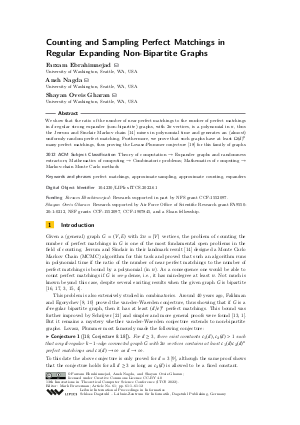Counting and Sampling Perfect Matchings in Regular Expanding Non-Bipartite Graphs
Authors Farzam Ebrahimnejad, Ansh Nagda, Shayan Oveis Gharan
-
Part of:
Volume:
13th Innovations in Theoretical Computer Science Conference (ITCS 2022)
Part of: Series: Leibniz International Proceedings in Informatics (LIPIcs)
Part of: Conference: Innovations in Theoretical Computer Science Conference (ITCS) - License:
 Creative Commons Attribution 4.0 International license
Creative Commons Attribution 4.0 International license
- Publication Date: 2022-01-25
File

PDF
LIPIcs.ITCS.2022.61.pdf
- Filesize: 0.53 MB
- 12 pages
Document Identifiers
Subject Classification
ACM Subject Classification
- Theory of computation → Expander graphs and randomness extractors
- Mathematics of computing → Combinatoric problems
- Mathematics of computing → Markov-chain Monte Carlo methods
Keywords
- perfect matchings
- approximate sampling
- approximate counting
- expanders
Metrics
- Access Statistics
-
Total Accesses (updated on a weekly basis)
0PDF Downloads0Metadata Views
Abstract
We show that the ratio of the number of near perfect matchings to the number of perfect matchings in d-regular strong expander (non-bipartite) graphs, with 2n vertices, is a polynomial in n, thus the Jerrum and Sinclair Markov chain [Jerrum and Sinclair, 1989] mixes in polynomial time and generates an (almost) uniformly random perfect matching. Furthermore, we prove that such graphs have at least Ω(d)ⁿ many perfect matchings, thus proving the Lovasz-Plummer conjecture [L. Lovász and M.D. Plummer, 1986] for this family of graphs.
Cite As Get BibTex
Farzam Ebrahimnejad, Ansh Nagda, and Shayan Oveis Gharan. Counting and Sampling Perfect Matchings in Regular Expanding Non-Bipartite Graphs. In 13th Innovations in Theoretical Computer Science Conference (ITCS 2022). Leibniz International Proceedings in Informatics (LIPIcs), Volume 215, pp. 61:1-61:12, Schloss Dagstuhl – Leibniz-Zentrum für Informatik (2022)
https://doi.org/10.4230/LIPIcs.ITCS.2022.61
BibTex
@InProceedings{ebrahimnejad_et_al:LIPIcs.ITCS.2022.61,
author = {Ebrahimnejad, Farzam and Nagda, Ansh and Gharan, Shayan Oveis},
title = {{Counting and Sampling Perfect Matchings in Regular Expanding Non-Bipartite Graphs}},
booktitle = {13th Innovations in Theoretical Computer Science Conference (ITCS 2022)},
pages = {61:1--61:12},
series = {Leibniz International Proceedings in Informatics (LIPIcs)},
ISBN = {978-3-95977-217-4},
ISSN = {1868-8969},
year = {2022},
volume = {215},
editor = {Braverman, Mark},
publisher = {Schloss Dagstuhl -- Leibniz-Zentrum f{\"u}r Informatik},
address = {Dagstuhl, Germany},
URL = {https://drops.dagstuhl.de/entities/document/10.4230/LIPIcs.ITCS.2022.61},
URN = {urn:nbn:de:0030-drops-156579},
doi = {10.4230/LIPIcs.ITCS.2022.61},
annote = {Keywords: perfect matchings, approximate sampling, approximate counting, expanders}
}
Author Details
Funding
- Ebrahimnejad, Farzam: Research supported in part by NFS grant CCF-1552097.
- Gharan, Shayan Oveis: Research supported by Air Force Office of Scientific Research grant FA9550-20-1-0212, NSF grants CCF-1552097, CCF-1907845, and a Sloan fellowship.
References
-
N. Anari, S. Oveis Gharan, and C. Vinzant. Log-concave polynomials i: Entropy and a deterministic approximation algorithm for counting bases of matroids. Duke Mathematical Journal, 2021. to appear.

-
Alexander Barvinok. A bound for the number of vertices of a polytope with applications. Combinatorica, 33(1):1-10, 2013.

-
Alexander I. Barvinok. Polynomial time algorithms to approximate permanents and mixed discriminants within a simply exponential factor. Random Struct. Algorithms, 14(1):29-61, 1999.

-
Ivona Bezáková, Daniel Stefankovic, Vijay V. Vazirani, and Eric Vigoda. Accelerating simulated annealing for the permanent and combinatorial counting problems. In SODA, pages 900-907. ACM Press, 2006.

-
Béla Bollobás and Brendan D McKay. The number of matchings in random regular graphs and bipartite graphs. Journal of Combinatorial Theory, Series B, 41(1):80-91, 1986.

-
Charles Bordenave. A new proof of Friedman’s second eigenvalue Theorem and its extension to random lifts. Annales scientifiques de l'Ecole normale supérieure, 2019.

-
M. Chudnovsky and P Seymour. Perfect matchings in planar cubic graphs. Combinatorica, 32:403-424, 2012.

-
G.P. Egorychev. The solution of van der waerden’s problem for permanents. Advances in Math., 42:299-305, 1981.

-
Louis Esperet, František Kardoš, Andrew D. King, Daniel Král, and Serguei Norine. Exponentially many perfect matchings in cubic graphs. Advances in Mathematics, 227(4):1646-1664, July 2011.

-
D. I. Falikman. Proof of the van der waerden’s conjecture on the permanent of a doubly stochastic matrix. Mat. Zametki, 29(6):931-938, 1981. (in Russian).

-
J. Friedman. A proof of alon’s second eigenvalue conjecture and related problems. Mem. Amer. Math. Soc., 195(910), 2008.

-
David Gamarnik and Dmitriy Katz. A deterministic approximation algorithm for computing the permanent of a 0,1 matrix. Journal of Computer and System Sciences, 76(8):879-883, 2010.

-
Leonid Gurvits. Hyperbolic polynomials approach to van der waerden/schrijver-valiant like conjectures: sharper bounds, simpler proofs and algorithmic applications. In Jon M. Kleinberg, editor, STOC, pages 417-426. ACM, 2006.

-
Mark Jerrum and Alistair Sinclair. Approximating the permanent. SIAM journal on computing, 18(6):1149-1178, 1989.

-
Mark Jerrum, Alistair Sinclair, and Eric Vigoda. A polynomial-time approximation algorithm for the permanent of a matrix with nonnegative entries. Journal of the ACM (JACM), 51(4):671-697, 2004.

-
Mark Jerrum and Umesh V. Vazirani. A mildly exponential approximation algorithm for the permanent. Algorithmica, 16(4/5):392-401, 1996.

-
N. Linial, A. Samorodnitsky, and A. Wigderson. A deterministic strongly polynomial algorithm for matrix scaling and approximate permanents. Combinatorica, 20:545-568, 2000.

-
L. Lovász and M.D. Plummer. Matching Theory. Elsevier Science, 1986.

-
Robert W. Robinson and Nicholas C. Wormald. Almost all regular graphs are hamiltonian. Random Structures & Algorithms, 5(2):363-374, 1994.

-
Mark Rudelson, Alex Samorodnitsky, and Ofer Zeitouni. Hafnians, perfect matchings and gaussian matrices. Ann. Probab., 44(4):2858-2888, July 2016.

-
A. Schrijver. Counting 1-factors in regular bipartite graphs. Journal of Combinatorial Theory, B 72:122-135, 1998.

-
R Michael Tanner. Explicit concentrators from generalized n-gons. SIAM Journal on Algebraic Discrete Methods, 5(3):287-293, 1984.

